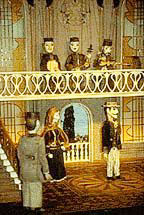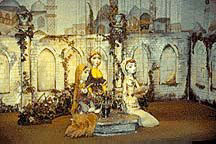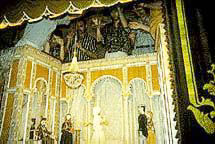|

Autumn 1994 (2.3)
Pages 64-66
 The
Magic of the Children's Marionette Theater
The
Magic of the Children's Marionette Theater
Conserving
the Culture
Back
to Hajibeyov.com - Music Index
- by Betty Blair
It's magical - a spectacular
celebration for the eyes! You sit there in the tiny darkened
room with your eyes glued to the tiny marionette figures, each
one exquisitely designed, moving so gracefully across the stage
and you soon find yourself mesmerized. Is it the costumes? The
expressive faces? The beautifully, painstakingly detailed stage
settings? The humor? The operatic music, or the close proximity
of audience to stage? Perhaps, it's the grandeur of turn-of-the-century
Baku and the intriguing plot of boy trying to meet the right
girl. Whatever the reason, Azerbaijan's new Children's Marionette
Theater succeeds in casting its hypnotic spell over adult and
child alike.
And it's exactly the effect that Tarlan Gorchu, Artist / Director
/ Producer, has been working so hard to create these past four
years since he started.
Just recently, a young child became so enraptured by the two
little bird marionette figures flitting around the courtyard
fountain that the child jumped from his seat and rushed to the
stage to try to catch the tiny creatures.
  Emergence of a New Form
of Theater Emergence of a New Form
of Theater
Azerbaijan has a tradition of
Puppet Theater, but marionettes are new. In fact, Tarlan had
never even seen marionettes himself until 1986 when he was invited
to a Puppet Festival in Tbilisi, Georgia.
After that experience, it slowly dawned on him that marionettes
were a form that could merge his love for both performance arts
as well as graphic arts. "I'm an artist," he'll tell
you. "I was in search of a theater in which I could apply
my painting and over which I could have much more control."
It's not just the difficulty of managing the moods and idiosyncrasies
of leading actors and actresses in live theater that Tarlan refers.
It's the economic reality that has set in since the dissolution
of the Soviet system. It's impossible these days to stage spectacular
theater with large casts. Also, there's an incredible emotional
need to have some control when the nation is facing so many crises
lately.
For example, since independence in 1991, the national leadership
has since changed five times, a new alphabet (Latin-based) and
a new currency have been introduced. Many people, especially
artists (musicians, dancers, theater and opera performers, filmmakers.)
have had to find their own financial support and, subsequently,
have had to leave the arts. The psyche of the nation has been
deeply affected by the tragedy of the war, loss of nearly 20%
of national territory and the subsequent flight by so many refugees.
The Story
"Arshin Mal Alan"
To date, Tarlan has managed
to produce only one story -"Arshin Mal Alan"(The Cloth
Peddler), which has been performed a few dozen times. Its 12
episodes with six separate sets and dozens of marionettes lasts
about 80 minutes. The plot is based on an operetta written in
1910 by one of Azerbaijan's foremost composers, Uzeyir Hajibayov.
Tarlan's marionette version is a musical comedy, interspersed
with taped operatic selections that are performed specifically
for this theater by some of Azerbaijan's best known contemporary
opera singers like Khuraman Gasimova.
Tarlan went to incredible lengths to research the historical
period in which the story is set. He visited museums, studied
interiors of exquisite residences built by oil barons, browsed
through old post card and photo collections, and interviewed
people who fondly remembered the era.
Everything had to be authentic and natural. Friends scoured the
city for old antique clothing until they found velvet, brocade
silk, and gold thread. The tiniest detail was anticipated - from
the elegant chandeliers and traditional musical instruments to
the colorful, woven camel saddlebags, inlaid parquet floors,
delicate red roses and fountain gracing the courtyard.
Preserving
the Culture
One of Tarlan's goals is to
make young people fall in love with the traditional Azerbaijan
stories. "I want to show the richness of our culture. Every
nation should have its own classic works that are passed down
from generation to generation. If we don't instill a deep love
for our own stories, they may disappear. Then it will be too
late. It's like the facades of our buildings that were constructed
by the oil wealth at the turn of the century. They might be in
serious disrepair right now, but nonetheless, they are reminiscent
of a beautifully rich and glorious past that belonged to us."
Tarlan sees his theater as timeless not confined to contemporary
problems. Though he, himself, doesn't have children, he feels
it's essential that young people learn early that life is full
of complexities which have to be understood.
"Maybe children who are young won't really understand the
story completely but it's good to introduce it anyway,"
he'll tell you. "In the West, they take children to see
Michaelangelo and other great artists. It doesn't mean the child
understands totally. But art always makes a deep impression.
It's an important start."
Technology plays a very important role in marionettes. The puppets
are difficult to operate and the team has had to teach themselves.
But they've mastered them so well that much of the humor is conveyed
in movement, not just the story line. For example, when the servant
slides down the stairway banister so effortlessly, or again when
he's imitating authentic Azerbaijani folk dances and becomes
so excited that he literally flies up in the air.
The Marriage
Scene
Although Hajibeyov obviously
wrote the opera eighty-five years ago to press for more progressive
attitudes towards marriage, the theme is still relevant today.
Young people are always obsessed with finding the right partner.
It's an ageless story, not limited to time or place.
Of course, in the urban setting, young people can select their
own partners although family and friends rarely stand idly by.
And there's still considerable pressure, especially on girls,
to marry early. It's permissible by law at 17 now and so if a
young woman isn't married by 21 or 22, parents often become anxious.
But the war complicates matters these days. It's harder and harder
for young people to meet. Strained finances mean fewer parties
and thus fewer opportunities for young people to meet. The "Martyr's
Cemetery" in every major city is a heart-wrenching reminder
that there are fewer partners from which to select.
Big Dreams
for Marionette Theater
Tarlan has dreams-big dreams
for his productions. They've already taken the marionettes abroad-to
France in 1990 and a Puppet Festival in Florida in 1992.
He wants a building that they can call their own. The State,
which still owns all property, has designated a building but
it's in sad disrepair and they don't have the money to fix it
yet. They're still a long way from becoming self-sufficient.
The truth is they really haven't made any money at all. Lately,
they've been doing benefits, charging a used toy as "admittance
fee" for each child which, in turn, they distribute among
toy-less refugee children.
In order for this theater to survive, Tarlan feels he needs at
least three major productions in his repertoire. Each set takes
about three years to design. He's already started the second,
another favorite folk theme, "Leyla Majnun."
With three productions, Tarlan believes the theater could outlive
him and a School of Marionette Theater could be established in
Azerbaijan. In real theater, it's so rare to be able to carry
a production for more than five years. Actors and actresses come
and go but with puppets, Tarlan is convinced, it's a different
story. Their magic could captivate the hearts of children (large
and small) for years and years to come.
From Azerbaijan International
(2.3)
Autumn 1994.
© Azerbaijan International 1994. All rights reserved.
Back
to AI 2.3 (Autumn 1994)
AI Home Page
| Magazine
Choice
| Topics
| Store
| Contact
us
|




